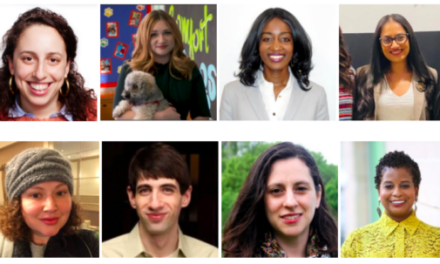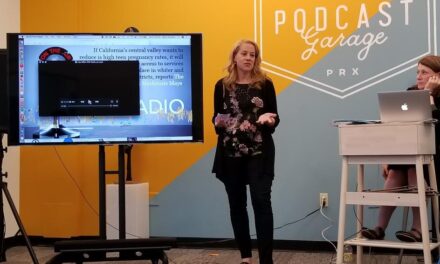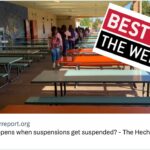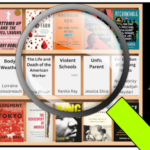
What — if anything — should reporters do when their credibility is challenged in public?
By Alexander Russo
It’s no easy task for reporters to report and describe the competing and contradictory claims that advocates make on contentious education issues.
It’s even harder to do in real time during an interview or live event when one of the people you’re talking to is publicly doubting the credibility and accuracy of your organization’s work.
That’s why it was so interesting to watch the Los Angeles Times’ longtime education reporter Howard Blume moderate a panel at the University of Southern California in late January for the Education Writers Association (EWA) mini-conference on charter schools – and to talk with him and others after the event about the challenges and issues that came up.
Early on in the contentious session, United Teachers of Los Angeles (UTLA) head Alex Caputo-Pearl slammed the education coverage of the LA Times:
“You’re not going to get real objective reporting [from the LA Times],” said Caputo-Pearl. “But Howard does a great job.”

Pictured: Caputo-Pearl and Blume
Blume let the remark pass. Nobody else in the room uttered a peep — including me.
Some will think that was a fine course of action to take, and their arguments are familiar and good ones. Others will struggle to remember the exchange or find it too inconsequential to consider. And handful would agree, publicly or otherwise, that the LA Times’ coverage is compromised.
However, my view is that this was a small but important moment for education journalism and that someone – Blume, a fellow reporter, an EWA staffer – should have said something about Caputo-Pearl’s claim, and if necessary the rest of us should have backed that person up.
At an event organized for and largely attended by education journalists, a panelist made an unsupported attack on the integrity of a major legacy news outlet while sitting two seats away from the panel moderator who works at that news outlet. And nobody said a word.
__
Warranted or not, attacks on journalistic credibility seem to be on the rise in recent weeks and months, with either broad-brush criticisms such as “don’t believe everything you read” or more specific objections to publications or reporters.
But in the past at least, folks who speak in front of journalists in these particular kinds of conference settings have seemed glad for the chance to get their message out and tended towards being complimentary if not ingratiating with a roomful of reporters.
That was not the case at the LA event.
In Los Angeles, the tensions between charter schools and traditional school systems are intense, even by national standards. As noted by Blume, while only 16 percent of LAUSD students attend charters, the district has the largest number of charter schools and students in the nation – much higher than New York City, Chicago, and many other cities.
The sprawling district is governed by an elected school board, some of whose members are up for election next month. The campaigns often feature eye-popping levels of political contributions.
The hour-long discussion, called ”Eye On Los Angeles,” was part of a two-day EWA event designed to help education reporters figure out how to cover charter schools.
The panelists included Myrna Castrejon, head of a nonprofit organization called Great Schools LA (GSLA), newish LAUSD school board member Ref Rodriguez, UCLA professor Pedro Noguera and United Teachers of Los Angeles president Alex Caputo-Pearl.
This was the first time in recent memory that Castrejon and Caputo-Pearl had appeared together, giving the audience what Blume described as “an unfiltered back-and-forth.” And of course, union head Caputo-Pearl and Castrejon, whose organization was originally reported (by Blume) to be an effort to expand charter schooling in Los Angeles and is funded by pro-charter foundations, agreed on very little.
Next panel is on charters in LA with Ref Rodriguez, Alex Caputo-Pearl, Myrna Castrejon and Pedro Noguera. #ewacharters pic.twitter.com/bccCiZJRry
— Sarah Favot (@sarahfavot) January 27, 2017
There were at least three other points during which Blume jumped in to correct or clarify what was being said, and a handful of moments when he didn’t interject himself but might have.
The claim against the LA Times came during Caputo-Pearl’s introductory remarks, almost as a casual observation:
“You all know that there’s a growing influence on papers and media,” said Caputo-Pearl. “Eli Broad himself actually pays for part of the education reporting at the L.A. Times. You’re not going to get real objective reporting there. But Howard does a great job.”
For the past few years, the Los Angeles Times has received funding from outside sources including the Broad Foundation to support expanded education coverage. Several other major news outlets including NPR, the Boston Globe, the Seattle Times, and Univision also accept outside funding from philanthropic organizations in support of education coverage.
[Over the past two years, The Grade has received funding from the AFT, the Walton Foundation, the Broad Foundation and the Gates Foundation, among others.]
Caputo-Pearl gave no evidence to back up his claim, and close observers of the LA Times’ education coverage note that the paper’s treatment of charter schools doesn’t seem to have softened since the outside funding arrived.
Later on during the event, Caputo-Pearl himself praised Blume for a story about a charter school scandal and gave a nod to the journalists in the room. “Give Howard a little props here and by the way thank you everybody for the work that you all do.”
The hashtag for the conference is #EWAcharters. You can listen to audio of the LAUSD panel here:
__
Asked about similar experiences, education reporters and editors recount any number of situations in which public officials criticized their work, including in public or on social media.
Sometimes, journalists find that it works to respond immediately and publicly to the criticism. But in many cases, reporters prefer saving their responses for a private moment.
“I try and remind them if they have an issue with my story, they can always call me directly and we can talk about it. The public shaming isn’t necessary,” said Jennifer Pignolet of the Tennessee Commercial Appeal. “Sometimes that works, and sometimes I just have to sit there and take it.”
“People have been questioning me a lot in emails,” says the Monterey Herald’s Claudia Melendez. “I respond to all their concerns as politely as I can. If people start insulting me, which they have, I tell them they’re being offensive and then respond politely. I don’t like inflaming things.”
Other times the questions are raised in public, says Melendez. But again, it worked out not to respond publicly in the moment. “A very belligerent activist once called me out, by name, during public comments of a school board meeting… At the end of the meeting I went up to him and told him: you know who I am, you have my phone number, and the next time you have a problem with my stories, you call me directly. Don’t come trying to shame me in public when you haven’t even approached me for a correction. He never did it again.”
One obvious danger of responding immediately or publicly is that things escalate and the relationship is further eroded. But a danger of not responding is that if the claim goes unchecked, it might spread.
In a few cases, the quiet approach seems to have backfired.
Former Houston Chronicle reporter Brian Rosenthal says that his reporting was twice attacked “publicly and aggressively” by a state-level education official. In a column posted online, the state official critiqued a story about his use of personal time that included “highly misleading statements and outright inaccuracies.”
The paper stood by Rosenthal’s story but didn’t respond publicly.
“Unfortunately, as we stayed silent, the official continued his campaign against us and even got some rival reporters to buy it,” according to Rosenthal, who is now at the New York Times. The official responded publicly to a second story in a way that “criticized and mocked the story and me personally.”
“This time, the editors decided to publicly respond to the allegations… The official’s campaign against us stalled and other reporters rallied to our defense.”
__
Blume ignored the comment and kept moving along.
“It didn’t particularly bother me,” said Blume afterward. “I get criticized all the time, as does the paper. I always try to listen to the substance of criticisms, however, because sometimes the critic has an excellent point… It is certainly fair game for someone to criticize the arrangement with outside funders, but with or without that funding, it still would be reasonable to scrutinize the paper’s work for accuracy, substance and fairness.”
He also noted that Caputo-Pearl apologized privately for his remarks after the event.
And he wasn’t the only one who felt comfortable with the exchange. Asked about the event, EWA’s Caroline Hendrie expressed only praise. “We think Howard did a terrific job,” said Hendrie. “He was fair, assertive, and unflappable. Just what was needed under the circumstances.” Caputo-Pearl “was not attacking the reporter’s own work or integrity,” according to Hendrie, and pushing back “would have been a distraction.”
“Caputo-Pearl’s comment certainly jumped out, and I thought about saying something, since I have long respected Howard’s reporting pre- and post-foundation funding,” said EdSource’s John Fensterwald in a post-event email. “But I figured it was off-topic, and the issue didn’t come up again.”
Others weren’t so sure about what the right course of action might have been – not only for Blume but for a roomful of fellow reporters.
“We journalists have to stand up for each other,” said Rosenthal about these kinds of situations in general. “When a reporter is criticized by a public official, and the reporter is in the right, others should be willing to speak up. We should remember that it’s not a zero-sum game and that ultimately, we are all on the same team.
Full house, fully focused. #edreportersrock #ewacharters pic.twitter.com/aHrP6rgTvM
— Emily Richmond (@EWAEmily) January 27, 2017
Blume is a veteran reporter, and Caputo-Pearl’s comments weren’t more than a generic swipe at the Times. Caputo-Pearl isn’t the only person who’s expressed concerns about the funding arrangement. And Blume stepped in at other moments to call out inaccuracies in what the panelists were saying.
But, all these months later, the moment still stands out – maybe even more so, given the back and forth between the Trump White House and the press corps trying to cover the administration, the way that “fake news” has turned into a denunciation of journalism as much as a concern about hoaxes and conspiracy theories, and the lack of cooperation with reporters from the DeVos-run US Department of Education.
I think Blume should have said something publicly on behalf of his colleagues at the LA Times and education reporters in general. And if he didn’t, someone else in the room should have.
That includes me. I tweeted about what had happened during the event: “No one’s going to say anything about @UTLAnow president’s slam against the LA Times education coverage? OK.” I raised my hand during the question-and-answer period. The person walking the microphone around the room came over and stood behind me. Then put my hand down.
I’d love to say that I held off because I thought it would be more constructive to approach Caputo-Pearl privately afterwards. But the reality is that I started thinking about how he might respond, and I wondered whether anyone else in the room would back me up.
ABOUT THE AUTHOR

Alexander Russo
Alexander Russo is founder and editor of The Grade, an award-winning effort to help improve media coverage of education issues. He’s also a Spencer Education Journalism Fellowship winner and a book author. You can reach him at @alexanderrusso.
Visit their website at: https://the-grade.org/












